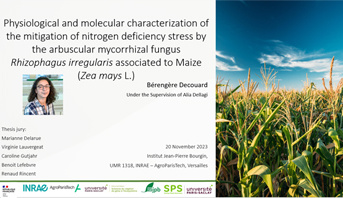Thesis defense: Bérengère Decouard
Monday, November 20, 2:00 pm, INRAE, Versailles
Physiological and molecular characterization of the mitigation of nitrogen deficiency stress by the arbuscular mycorrhizal fungus Rhizophagus irregularis associated with Maize (Zea mays L.)
Maize is currently the most productive cereal crop in the world. It can associate with the Arbuscular Mycorrhizal Fungus (AMF) Rhizophagus irregularis, which provides additional water and mineral nutrients to the plant in return for carbon delivered by the host plant. The AMF responses of two maize inbred lines were characterized at the physiological and molecular levels as they displayed contrasting responses to the inoculation with R. irregularis when grown under optimal, medium, or low N fertilization conditions. Physio-agronomical phenotyping, molecular and physiological characterization of these two lines indicates that (i) the level of N supply is the major factor affecting all studied traits; (ii) although both lines display different transcriptomic and metabolomic responses to R. irregularis, the agro-physiological traits are similar; and (iii) inoculation with the AMF relieves N deficiency stress. To explore more potential pathways affected by the symbiosis, we integrated transcriptomic data with iZMA6517, a recently developed multi-organ genome-scale model (GSM) combined with a metabolic bottleneck analysis (MBA). This led to the identification of nucleotide and ureide metabolism as pivotal actors in maize nitrogen nutrition during symbiosis. This well-known biological process had never been described before in the context of a plant/AMF symbiosis. To further unravel the mechanisms underlying maize-R.irregularis cross-talk, we developed an aeroponics-based culture system suitable for the analysis of maize root exudates during symbiosis with R. irregularis. We were able to monitor the level of strigolactone (SL) and specialized metabolite (SM) profiles in the root exudates of plants grown under different N and P nutritional conditions. We detected putative benzoxazinoids accumulating specifically in root exudates in response to the AMF. In conclusion, this research enhances understanding of the molecular and physiological processes involved in R. irregularis-mediated maize nitrogen nutrition.
Supervisor: Alia Dellagi - AgroParisTech, INRAE, IJPB, Versailles
Members of the jury:
> Caroline Gutjahr (Referee) - MPIMPP, Potsdam-Golm, Allemagne
> Virginie Lauvergeat (Referee) - Université de Bordeaux, INRAE, EGFV, Villenave-d'Ornon
> Marianne Delarue (Examinator) - Université Paris-Saclay, IPS2, Gif-sur-Yvette
> Benoît Lefèbvre (Examinator) - INRAE, LIPME, Castanet Tolosan
> Renaud Rincent (Examinator) - INRAE,GQE-Le Moulon, Gif-sur-Yvette
To attend, contact Alia Dellagi
Maize is currently the most productive cereal crop in the world. It can associate with the Arbuscular Mycorrhizal Fungus (AMF) Rhizophagus irregularis, which provides additional water and mineral nutrients to the plant in return for carbon delivered by the host plant. The AMF responses of two maize inbred lines were characterized at the physiological and molecular levels as they displayed contrasting responses to the inoculation with R. irregularis when grown under optimal, medium, or low N fertilization conditions. Physio-agronomical phenotyping, molecular and physiological characterization of these two lines indicates that (i) the level of N supply is the major factor affecting all studied traits; (ii) although both lines display different transcriptomic and metabolomic responses to R. irregularis, the agro-physiological traits are similar; and (iii) inoculation with the AMF relieves N deficiency stress. To explore more potential pathways affected by the symbiosis, we integrated transcriptomic data with iZMA6517, a recently developed multi-organ genome-scale model (GSM) combined with a metabolic bottleneck analysis (MBA). This led to the identification of nucleotide and ureide metabolism as pivotal actors in maize nitrogen nutrition during symbiosis. This well-known biological process had never been described before in the context of a plant/AMF symbiosis. To further unravel the mechanisms underlying maize-R.irregularis cross-talk, we developed an aeroponics-based culture system suitable for the analysis of maize root exudates during symbiosis with R. irregularis. We were able to monitor the level of strigolactone (SL) and specialized metabolite (SM) profiles in the root exudates of plants grown under different N and P nutritional conditions. We detected putative benzoxazinoids accumulating specifically in root exudates in response to the AMF. In conclusion, this research enhances understanding of the molecular and physiological processes involved in R. irregularis-mediated maize nitrogen nutrition.
Supervisor: Alia Dellagi - AgroParisTech, INRAE, IJPB, Versailles
Members of the jury:
> Caroline Gutjahr (Referee) - MPIMPP, Potsdam-Golm, Allemagne
> Virginie Lauvergeat (Referee) - Université de Bordeaux, INRAE, EGFV, Villenave-d'Ornon
> Marianne Delarue (Examinator) - Université Paris-Saclay, IPS2, Gif-sur-Yvette
> Benoît Lefèbvre (Examinator) - INRAE, LIPME, Castanet Tolosan
> Renaud Rincent (Examinator) - INRAE,GQE-Le Moulon, Gif-sur-Yvette
To attend, contact Alia Dellagi
Back
